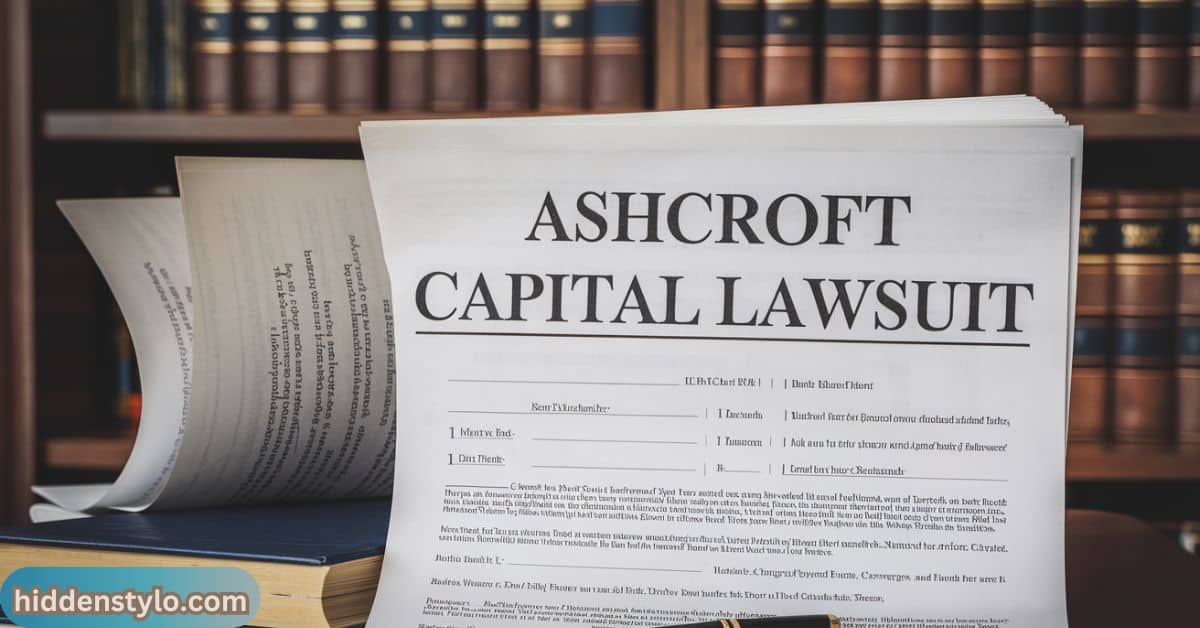Ashcroft Capital has made a name for itself as a significant player in the real estate investment industry. Specializing in multifamily properties, the firm promises high returns for investors. However, recent events have thrown Ashcroft Capital into the spotlight for reasons other than its investment strategies. A lawsuit has raised questions about the company’s business practices, leaving many investors wondering if their investments are at risk. This comprehensive guide will explore the Ashcroft Capital lawsuit, delve into the legal risks involved, and provide critical insights for current and potential investors.
Understanding Ashcroft Capital’s Investment Strategy
Before diving into the details of the lawsuit, it’s important to understand how Ashcroft Capital operates and what it offers to investors.
Key Investment Focus: Multifamily Real Estate
Ashcroft Capital primarily focuses on multifamily residential properties apartment buildings that promise steady income streams through rental payments. By acquiring properties, improving them, and increasing their value, Ashcroft aims to maximize returns for investors.
This strategy is known as a value-add investment approach, where the company buys properties in need of renovation and then adds value through upgrades, efficient management, and rent hikes.
Risk Management and Returns
Ashcroft Capital’s risk management approach typically involves leveraging market research, employing experienced property managers, and taking advantage of tax incentives, such as depreciation benefits. They often target markets that are growing or have potential for growth, particularly in regions with expanding job markets and increasing population.
The firm typically presents its projects as relatively low-risk, with the potential for above-average returns. In many cases, Ashcroft promises to generate double-digit returns for investors.
However, like all investments, real estate is inherently risky, and this is where things get complicated especially considering the legal challenges they now face.
Investor Experiences: Praises, Concerns, and the Lawsuit
Ashcroft Capital has a large and diverse investor base, and feedback has been mixed. Some investors praise the firm for its transparency, clear communication, and strong returns. Others have raised concerns, particularly surrounding the Ashcroft Capital lawsuit that has recently gained attention.
Positive Reviews: High Returns and Good Communication
Ashcroft Capital has generally received positive feedback from its investors, especially those who have benefited from the firm’s value-add strategy. According to several investor testimonials, Ashcroft has delivered solid returns on many of its real estate projects, with some investors seeing annual returns of 10-15%. Many appreciate the company’s proactive communication, where they receive regular updates on the status of their investments, including financial reports and property improvement progress.
Concerns and Complaints: Red Flags Before the Lawsuit
However, some investors have expressed concerns about lack of clarity in certain dealings, especially in relation to fees, property valuations, and the timing of returns.
These complaints, while not necessarily unique to Ashcroft, have drawn attention amid the legal troubles facing the company.
The Ashcroft Capital Lawsuit: A Closer Look
The Ashcroft Capital lawsuit has certainly put a strain on the company’s reputation. Investors are concerned about how the lawsuit could impact their investments, and what it means for the future of the company.
The Ashcroft Capital Lawsuit: Key Details and Legal Risks
Overview of the Lawsuit: What Happened?
In recent months, Ashcroft Capital has faced legal action from several investors and regulatory authorities. The lawsuit alleges misrepresentation and fraudulent business practices related to Ashcroft’s handling of investor funds and property valuations.
The plaintiffs claim that Ashcroft Capital did not provide full disclosure regarding risks associated with certain real estate projects, nor did they properly account for all fees and expenses tied to investments.
The lawsuit centers on the inaccurate financial reporting of certain properties and the alleged failure to adhere to contractual obligations regarding returns and transparency.
Ashcroft Capital has denied these allegations, maintaining that it adhered to all legal and financial requirements in its business operations.
Potential Impact on Investors
For investors, the key question is whether the Ashcroft Capital lawsuit could jeopardize their funds. The lawsuit could result in financial penalties or a settlement, which may affect the company’s cash flow.
While the lawsuit itself does not automatically mean Ashcroft is a “bad” investment, it does raise questions about the firm’s internal controls and financial practices.
The potential risks for investors include:
- Reduced returns: If Ashcroft Capital is found liable, any settlements or penalties could reduce profits or disrupt current projects.
- Fund freeze or reallocation: In some cases, legal actions can lead to freezes on funds or a reallocation of investments to cover legal expenses.
- Damage to reputation: The longer the lawsuit drags on, the greater the chance that Ashcroft Capital’s reputation may suffer. This could affect future investments and create a ripple effect throughout the real estate industry.
Lessons from Other Real Estate Investment Lawsuits
Ashcroft Capital is not the first real estate investment firm to face legal challenges. In fact, several well-known firms have gone through similar struggles. Studying these cases can offer valuable insights for investors looking to navigate the risks associated with real estate investment.
Notable Lawsuits in Real Estate Investment
- The Blackstone Group Lawsuit (2017): Blackstone faced a lawsuit after allegations of fraudulent property appraisals and the failure to disclose risks to investors. The company settled for a large amount but avoided a lengthy court battle.
- The Colony Capital Settlement (2020): Colony Capital faced accusations of misrepresentation and failure to disclose risks to investors in its real estate-backed funds. The company agreed to pay out a significant sum to affected investors.
These cases show that even large firms with significant resources can face serious legal consequences when investor trust is compromised. Due diligence and transparency are key in preventing such issues.
Key Takeaways for Investors
- Always research the company’s legal history before investing.
- Understand how property valuations are determined and how fees impact your potential returns.
- Ensure that the firm you invest in maintains clear, honest communication throughout your investment.
How to Protect Your Investments from Legal Risks

When considering a real estate investment like those offered by Ashcroft Capital, it’s crucial to be proactive about protecting your capital. Here’s how you can reduce the risk of exposure to legal troubles and ensure that your investments are as safe as possible.
Conduct Thorough Due Diligence
Before investing in any firm, especially one currently involved in a lawsuit, conducting due diligence is essential. This means going beyond simply reading marketing materials and instead diving deep into the company’s financials, management team, and past legal history.
- Research company leadership: Check the backgrounds of the executives and board members. Have they been involved in previous legal disputes?
- Review financial statements: Make sure the company’s finances are transparent and free from discrepancies.
- Check regulatory filings: If the company is publicly traded or regulated, look for any SEC filings or government inquiries related to their operations.
Review Legal Documents Carefully
One of the most important ways to protect your investment is by reviewing legal documents before signing anything. This includes:
- Investment contracts: Understand what you’re signing up for, including terms related to fees, return expectations, and risk disclosures.
- Risk factors: Ensure the company provides clear, understandable information on potential risks.
- Exit strategies: Make sure there’s a clear plan for how and when you can exit the investment, especially if things go wrong.
Look for Transparency and Compliance
Transparency is one of the best indicators that a firm is trustworthy. Ashcroft Capital, like any other investment company, should provide regular updates on the status of its investments, the financial performance of its properties, and any changes to the investment plan.
Seek Professional Advice
If you’re unsure about any aspect of your investment, consider consulting with a financial advisor or real estate attorney. They can help you understand the risks involved and ensure that your investment strategy is solid.
Conclusion: Is Ashcroft Capital a Safe Investment?
The Ashcroft Capital lawsuit raises important questions about the safety of investing with the firm. While the lawsuit has certainly sparked concerns, it’s not necessarily a death knell for Ashcroft’s investment strategy. However, the ongoing legal challenges do make it crucial for investors to remain vigilant and well-informed.
Ultimately, whether Ashcroft Capital remains a safe investment depends on the resolution of the lawsuit and how well the firm adapts its business practices moving forward. Investors should take steps to protect themselves by conducting thorough due diligence, reviewing legal documents, and seeking professional advice.
FAQs
What is the Ashcroft Capital lawsuit about?
The lawsuit alleges fraudulent business practices and misrepresentation of investment risks and returns, particularly related to Ashcroft’s handling of funds and property valuations.
How does this lawsuit affect my investments with Ashcroft Capital?
While the lawsuit doesn’t automatically mean that Ashcroft’s investments are bad, it could impact the company’s financial stability, leading to potential delays or reduced returns. Investors should stay informed about any developments.
Can I still trust Ashcroft Capital after the lawsuit?
Trust in Ashcroft Capital will depend on how the company resolves the lawsuit and its commitment to improving transparency and compliance moving forward.
What should I do if I’m currently invested in Ashcroft Capital?
Review your investment documents, stay updated on legal developments, and consider consulting a financial advisor to assess your options.
How can I protect myself from legal risks in real estate investments?
Conduct thorough due diligence, review legal documents carefully, ensure transparency from the company, and seek professional advice when necessary.
By taking the right precautions and remaining informed, you can navigate the complex world of real estate investment with greater confidence, even when lawsuits like the Ashcroft Capital lawsuit emerge.

